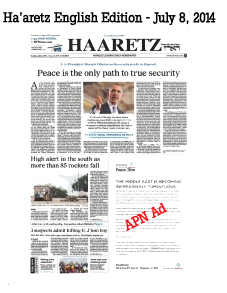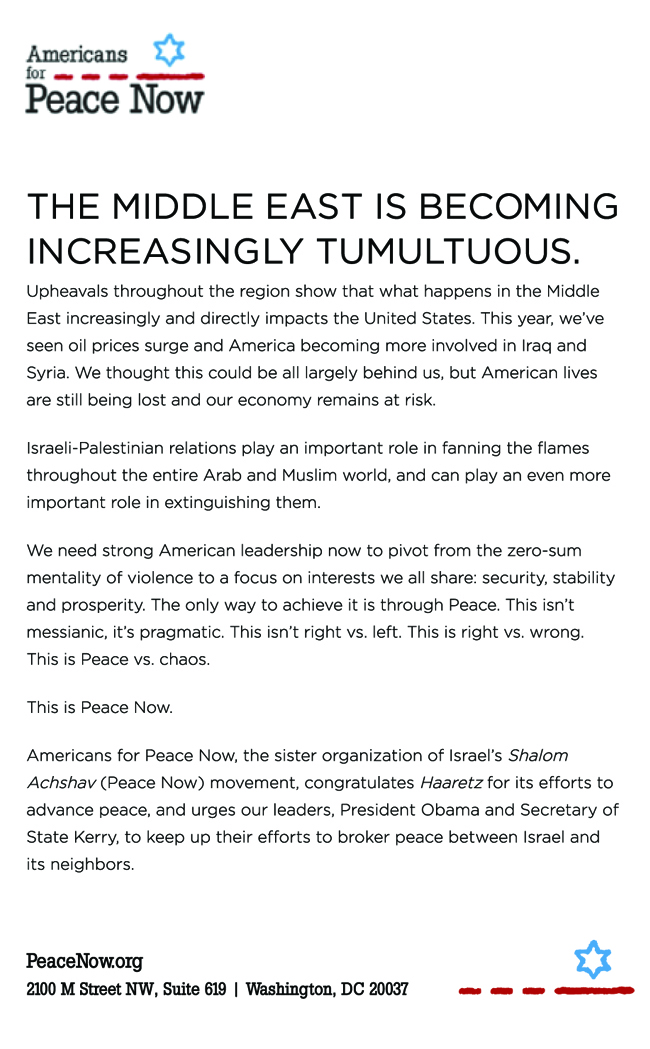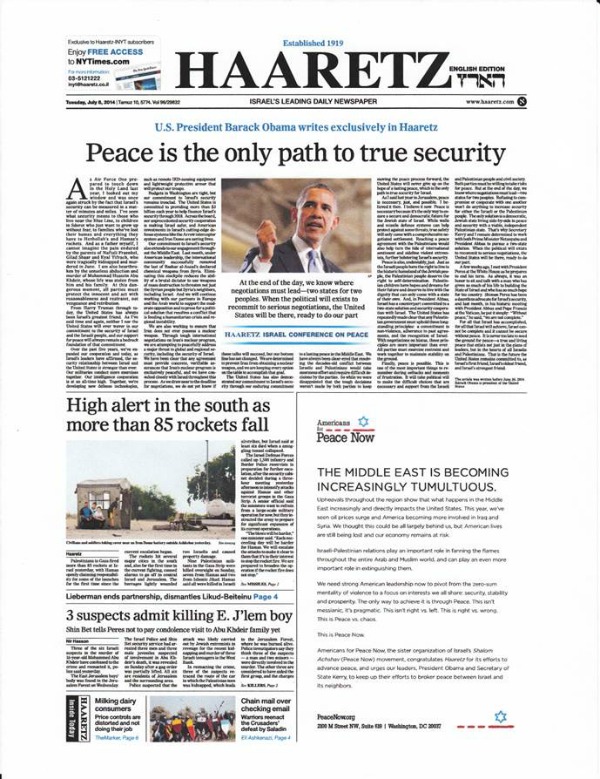Don't miss these important articles from American President Barack Obama and Palestinian President Mahmoud Abbas
from Haaretz's Israel Conference on Peace, today:
Palestine's vision of
peace is clear
By Mahmoud Abbas
We believe that no just and lasting peace can be achieved without respecting the rights of everyone, including
both Palestinians and Israelis.
Twenty-six years have passed since the Palestine Liberation Organization officially endorsed the two-state
solution. In a painful and historic decision, Palestine recognized the State of Israel based on pre-1967 territory,
conceding over 78 percent of Palestinian land. Rather than seize this opportunity for peace, the current Israeli
government has chosen to use the peace process as a smoke screen for more colonization and oppression. We still
wish to believe that our Israeli neighbors do not expect the Palestinian people to live under a system of
apartheid. The desire of a peace- and freedom-loving nation for independence can’t be eliminated by force.
Palestine’s vision of peace is clear, and grounded firmly in principles of international law. This is because we
believe that no just and lasting peace can be achieved without respecting the rights of everyone, including both
Palestinians and Israelis. In accordance with these principles, the sovereignty of the states of Palestine and
Israel, as bound by the 1967 international border, must be respected; and the rights of Palestinian refugees must
be honored in accordance with United Nations General Assembly Resolution 194.
Continue Reading
Peace is the only
path to true security for Israel and the Palestinians
By Barack Obama
"As I said last year in Jerusalem, peace is necessary, just, and possible. I believed it then. I believe it
now. Peace is necessary because it’s the only way to ensure a secure and democratic future for the Jewish state of
Israel...Peace is also, undeniably, just."
As Air Force One prepared to touch down in the Holy Land last year, I looked out my window and was once again
struck by the fact that Israel’s security can be measured in a matter of minutes and miles. I’ve seen what security
means to those who live near the Blue Line, to children in Sderot who just want to grow up without fear, to
families who’ve lost their homes and everything they have to Hezbollah’s and Hamas’s rockets.
And as a father myself, I cannot imagine the pain endured by the parents of Naftali Fraenkel, Gilad Shaar and Eyal
Yifrach, who were tragically kidnapped and murdered in June. I am also heartbroken by the senseless abduction and
murder of Mohammed Hussein Abu Khdeir, whose life was stolen from him and his family. At this dangerous moment, all
parties must protect the innocent and act with reasonableness and restraint, not vengeance and retribution.
Continue Reading





 Israeli strategic affairs expert Yossi Alpher, who authors Hard Questions Tough Answers, APN's
weekly news analysis, was our guest on Thursday, July 3rd, for a briefing call on the current
Israeli-Palestinian security crisis and its repercussions. Since Thursday, Alpher's presentation has been
overtaken by events; we have included here the still relevant Q&A session.
Israeli strategic affairs expert Yossi Alpher, who authors Hard Questions Tough Answers, APN's
weekly news analysis, was our guest on Thursday, July 3rd, for a briefing call on the current
Israeli-Palestinian security crisis and its repercussions. Since Thursday, Alpher's presentation has been
overtaken by events; we have included here the still relevant Q&A session.
